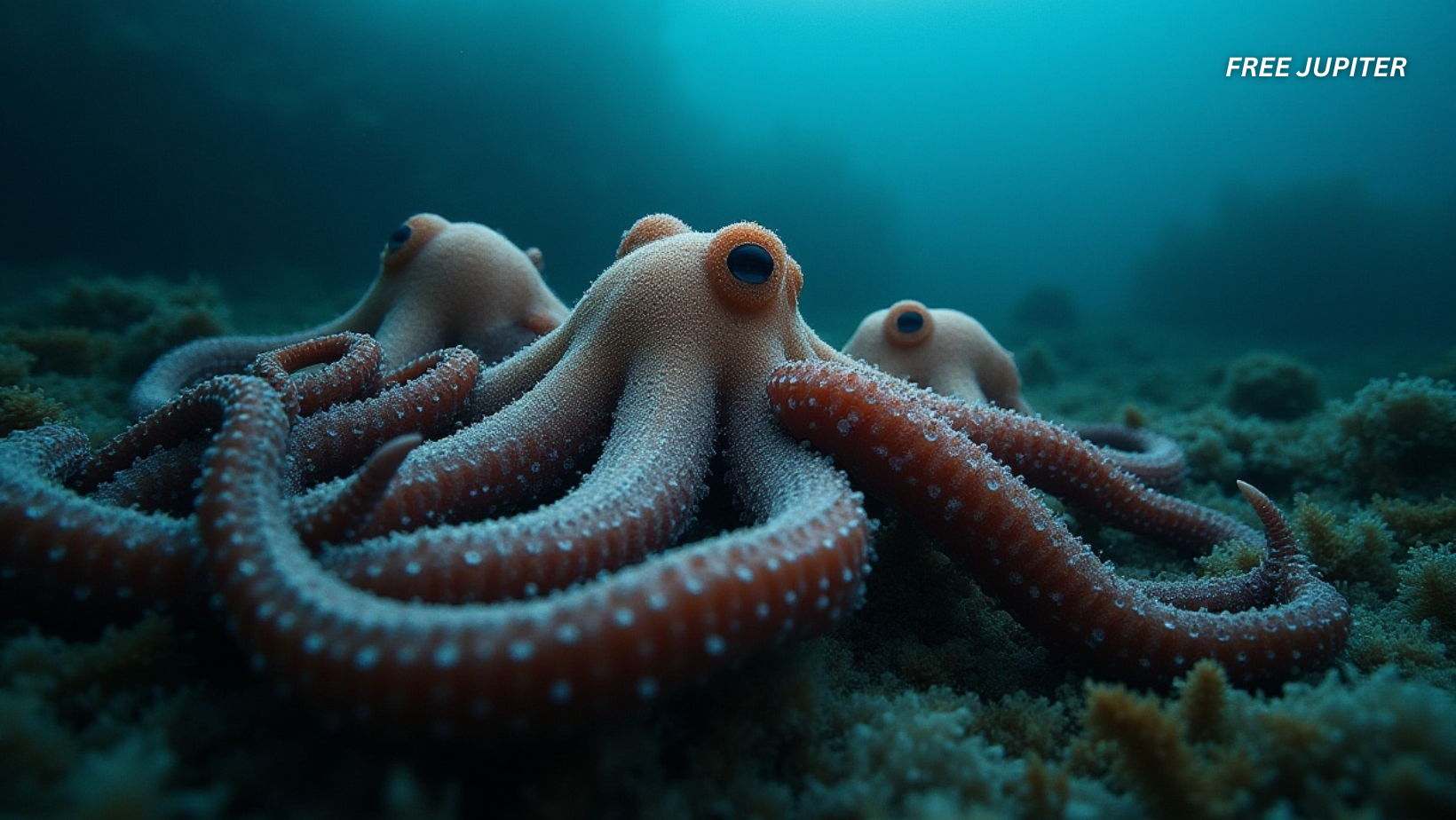Friendly Note: FreeJupiter.com shares general info for curious minds 🌟 Please fact-check all claims—and always check health matters with a professional 💙
For centuries, the octopus has carried an air of mystery. Known as escape artists of the ocean, they are intelligent, elusive, and often described as loners of the sea. Marine textbooks long reinforced this idea: octopuses live alone, defend their dens fiercely, and only seek out one another briefly to mate. But a strange discovery off the coast of Australia has begun to rewrite that story.
Beneath the waves of Jervis Bay in New South Wales, researchers have uncovered something they never expected—an octopus neighborhood. Nicknamed Octlantis, this gathering place looks like a miniature underwater city made of shells, where multiple octopuses live side by side, interacting in ways that defy their reputation as solitary creatures.
What scientists have observed here is both fascinating and a little chaotic: shell-built dens, tense stand-offs, evictions, bold mating attempts, and even nonchalant indifference toward lurking predators. Octlantis is not a peaceful utopia, but it is a community—and that alone is enough to challenge everything we thought we knew about these enigmatic animals.
The Discovery of Octlantis
Marine biologists first noticed this unusual congregation while studying the gloomy octopus (Octopus tetricus), a species native to Australia’s eastern and southern waters. The gloomy octopus, despite its name, is a clever and adaptable animal that typically makes its home in dens it builds from rocks, shells, or whatever debris it can find on the ocean floor.
When researchers, including Professor David Scheel from Alaska Pacific University and Stephanie Chancellor from the University of Illinois at Chicago, investigated the site, they counted as many as 15 octopuses living in close quarters. The animals had constructed dens by stacking discarded scallop and clam shells around natural rocky outcroppings.
The result looked oddly like a small town: clusters of shell “houses,” each occupied by an octopus that would emerge to hunt, patrol, or spar with its neighbors.
Social Life Under the Sea
What scientists observed at Octlantis was surprising, not only because of the number of octopuses gathered, but also because of their interactions.
- Evictions and Takeovers – Octopuses were seen chasing each other out of dens and claiming the space for themselves.
- Displays of Power – They used body language and color changes as warning signals, flashing dark shades or spreading their arms wide to intimidate rivals.
- Mating Behavior – Amid the conflicts, some males seized opportunities to mate, sometimes aggressively.
- Predator Encounters – Even with sharks like the camouflaged wobbegong nearby, the octopuses seemed more focused on each other than the dangers lurking outside their shell-built settlement.
It wasn’t peaceful, but it was undeniably social. Instead of keeping to themselves, these octopuses were living with constant interaction—a behavior more often associated with animals like dolphins, elephants, or primates.
Why Would Octopuses Gather?
If octopuses are supposed to be loners, what could drive them to live in such close proximity? Researchers have a few ideas:
- Limited Housing
The rocky outcroppings in Jervis Bay don’t provide many hiding spots, so octopuses may be forced to cluster around the few available shelters. Building dens from discarded shells makes sense when natural caves are scarce. - Abundant Food
The area is rich with clams and scallops, providing an easy source of prey. With so much food available, the octopuses can afford to live close to one another, even if competition is tense. - Accidental Communities
Marine biologists don’t believe octopuses are intentionally creating civilizations like humans do. Instead, these “cities” are probably the byproduct of survival instincts—food and shelter drawing them together in ways that resemble social living.
A Prequel Called Octopolis
Octlantis is not the first time such a phenomenon has been recorded. In 2009, a nearby site called Octopolis was discovered by diver Matt Lawrence. Like Octlantis, it was home to multiple gloomy octopuses living close together. But Octopolis had one unique feature: a piece of man-made debris in the middle of the site.
That object, possibly a scrap of metal, may have acted as a foundation for shell piles, encouraging the octopuses to build their dens around it. At first, scientists wondered if Octopolis was a one-off oddity caused by human interference. But the later discovery of Octlantis—where no human debris was present—suggested that octopus “cities” can form naturally under the right ecological conditions.
Read more: A New Shape-Shifting ‘Flapjack’ Octopus Has Been Discovered in the Deep Sea Near Australia
Rethinking Octopus Behavior
The discoveries of Octopolis and Octlantis have forced scientists to rethink long-held beliefs about octopuses. Traditionally, cephalopods (the group that includes octopuses, squids, and cuttlefish) were considered solitary, short-lived, and uninterested in social bonds.
But what’s happening at these sites suggests a more flexible reality. Under certain circumstances, octopuses may tolerate, and even adapt to, communal living. While their interactions may not be friendly in the human sense—there’s no evidence of cooperation or shared duties—the fact that they gather at all is remarkable.
As Professor David Scheel has pointed out, these behaviors could even shed light on how social complexity evolves in animals more broadly. Social living often comes with costs, like competition and conflict, but also with benefits, such as protection and access to resources. Observing how octopuses navigate these trade-offs might help scientists understand the building blocks of social behavior across species.
Octopus Intelligence: A Key to the Mystery
Part of what makes Octlantis so intriguing is the intelligence of octopuses themselves. Unlike most invertebrates, octopuses have incredibly large and complex nervous systems. About two-thirds of their neurons are distributed in their arms, giving each limb a surprising degree of independence.
- Solve puzzles and navigate mazes.
- Unscrew jars to access food inside.
- Use tools, such as coconut shells or rocks, for shelter and defense.
- Escape from aquariums with almost unbelievable ingenuity.
Given this intelligence, it may not be so surprising that octopuses are capable of complex social interactions when circumstances push them into close contact.
The Quirky City of Shells
Of course, Octlantis is no utopia. There are no laws, no harmony, and certainly no shared civic projects. Life there is competitive, messy, and often aggressive. But the mere fact that octopuses can and do live this way under certain conditions is a revelation.
Instead of being strictly solitary, they appear to exist on a spectrum—sometimes choosing solitude, but other times forced into communal living by nature’s design. In that sense, Octlantis is less like a carefully planned city and more like a makeshift settlement, shaped by circumstance, competition, and opportunity.
Why It Matters
The discovery of Octlantis matters for more than just curiosity. It pushes scientists to rethink assumptions about intelligence, behavior, and the social lives of animals we once dismissed as simple or primitive. It also raises bigger questions:
- Could communal living in octopuses offer insight into how intelligence evolves in different environments?
- Are octopuses capable of more complex social behaviors than we’ve recognized so far?
- What other surprises might be hiding in the oceans, waiting to challenge our understanding?
Read more: Male Pufferfish Build Mathematically Symmetrical Sand Designs to Win Over Mates
A City That Changes How We See Octopuses
Ultimately, Octlantis reminds us that the ocean is still full of mysteries. Just when we think we have a species figured out, it surprises us with something entirely new. Octopuses, with their alien-like appearance and remarkable intelligence, were already one of the ocean’s most fascinating creatures. Now, with evidence of underwater “cities,” they’ve added yet another twist to their story.
No, octopuses aren’t building civilizations. They aren’t carving out coral streets or trading shells like currency. But under the right conditions, they are showing us that even the loneliest creatures of the deep can become reluctant neighbors.
And that alone is enough to make us wonder what other secrets are hiding in the oceans we have yet to explore.










